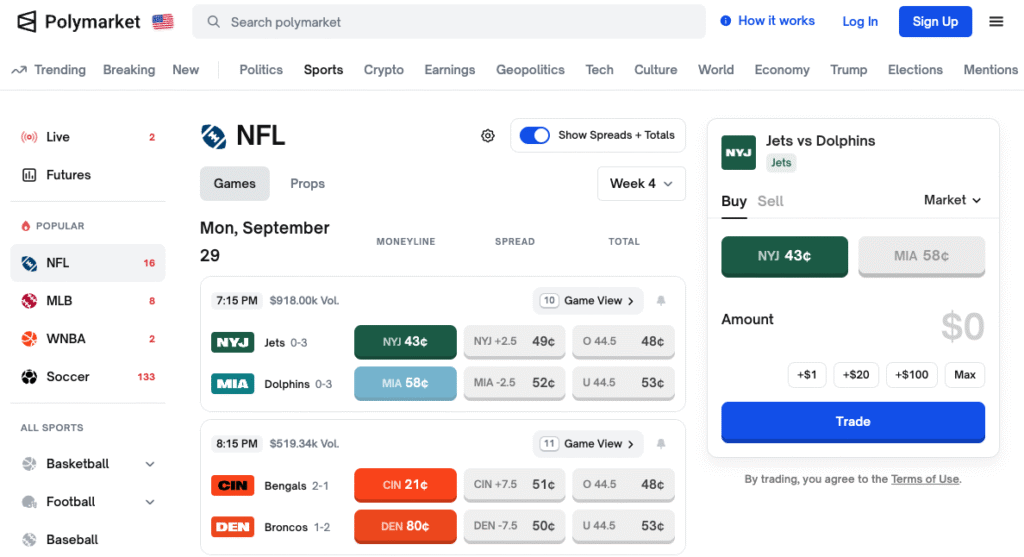Polymarket, Kalshi Founders Address Joint Panel About Future Of Prediction Markets

The founders of Kalshi and Polymarket joined forces Monday. Polymarket’s Shayne Coplan and Kalshi’s Tarek Mansour spoke during a joint federal regulatory hearing. The hearing. hosted by the SEC and CFTC. dealt with – in part - how prediction markets and event contracts should be regulated.
In a joint statement issued by the SEC and CTFC ahead of Monday’s discussion, the agencies said prediction markets are Prediction markets “are undergoing rapid growth with growing demand from both market operators and the public.”
The agencies should “provide clarity for innovators that want to list event contracts on prediction markets responsibly.” And “collaborate to consider where event contracts may be made available to U.S. market participants regardless of where the jurisdictional lines fall.”
However, neither founder directly addressed the challenges surrounding so-called sports event contracts.
Kalshi remains embroiled in litigation across multiple jurisdictions. The platform’s entry into the sports event market triggered the legal maneuvers. A recent analysis of Kalshi’s numbers say the platform received 70% of its trading volume from sporting event contracts.
Humbled to be speaking at the @SECGov & @CFTC joint roundtable today.
— Shayne Coplan 🦅 (@shayne_coplan) September 29, 2025
I'm on a panel with the CEOs of the most iconic exchanges: ICE, NASDAQ, CME, CBOE & more. Incredible to see regulators embrace young innovators alongside industry heavyweights.
How much can change in a year https://t.co/0uVZzn0Arb
Appearance Signifies How Far Platforms Have Evolved
Both Copland and Mansour alluded to their presence at the roundtable as a milestone in terms of how far their platforms have progressed in recent years. Once the subject of potential criminal actions, Kalshi and Polymarket's founders were featured as representatives of the future of American finance.
"It's refreshing to see how far we've come in terms of regulators willing to have us here," Mansour said.
"I was worried when I showed up there they were going to whisk me away to another room," Copland added.
The main issue of contention between Kalshi and Polymarket, and some of the more established traders, came during a discussion of regulatory timetables. Terrence Duffy of CME Group, which recently partnered with FanDuel to offer non-sports-related-trading contracts, said he wants a "level playing field" for everyone. He noted the differences between operators regulators governed by the SEC vs. those governed by the CTFC.
Copland countered by saying that the industry is in a "fork in the road" and that emerging platforms need a streamlined process because their products can be offered overseas immediately.
Duffy chuckled when Copland inadvertently referred to "older" participants. Duffy, 67, said he's been trading for 44 years. Copland, meanwhile, is 27.
Duffy also playfully jabbed at Kalshi over its "trading fees" when discussing his football trades from this past weekend.
That remark did not go unnoticed.
Kalshi Embattled In Court Across Several States
Most recently, the Massachusetts Attorney General sued Kalshi. She claims the site operates as an unlicensed sports book within the Commonwealth. Among the allegations made by the Massachusetts AG in its lawsuit:
- Kalshi’s sports contracts function as illegal sports wagers
- These trades, or “wagers,” lack the consumer protection that comes with legal and regulated books
- The trading platform does not adhere to advertising regulations that apply to sports books
- Kalshi lacks state licensure
In addition to countering the AG’s claims, Kalshi sued to have the case remanded to federal court. It claims the platform falls under CTFC jurisdiction, and thus not subject to state oversight.
The Mass AG responded to Kalshi’s request in federal court, reasserting its jurisdiction in the case. The matter remains pending.
Kalshi received cease-and-desist orders from Arizona, Illinois, Montana, and Ohio. It has ongoing litigation against New Jersey in the U.S. Court of Appeals for the Third Circuit. And it remains entangled in litigation with regulators in Maryland and Nevada.
"Kalshi offers its users a fair, transparent, federally-regulated, and nationwide marketplace. Rather than engage in dialogue with Kalshi as many other states have done, Massachusetts is trying to block Kalshi’s innovations by relying on outdated laws and ideas," a Kalshi spokesperson told bookies.com.
 bwin Casino Sign Up Bonus December 2025: Get 100 Free Spins
bwin Casino Sign Up Bonus December 2025: Get 100 Free Spins  Casino Days New Customer Welcome Bonus Canada December 2025 : Get $2,000 and 100 Free Spins
Casino Days New Customer Welcome Bonus Canada December 2025 : Get $2,000 and 100 Free Spins  Party Casino 100% Welcome Bonus December 2025: Claim a £20 Casino Bonus and 100 Free Spins
Party Casino 100% Welcome Bonus December 2025: Claim a £20 Casino Bonus and 100 Free Spins  GreenLuck Casino Sign Up Bonus Ireland December 2025: Get €500 and 200 Free Spins
GreenLuck Casino Sign Up Bonus Ireland December 2025: Get €500 and 200 Free Spins  Betano Casino New Customer Sign Up Bonus December 2025: Claim 100 Free Spins
Betano Casino New Customer Sign Up Bonus December 2025: Claim 100 Free Spins  Mr Vegas Casino Sign Up Offer December 2025: 100% Welcome Bonus + 11 Free Spins
Mr Vegas Casino Sign Up Offer December 2025: 100% Welcome Bonus + 11 Free Spins
Comments